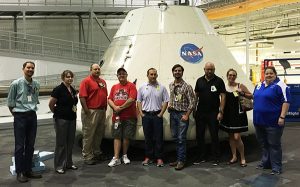
Taking time out to tour the Johnson Space Center in Houston, these eight high school teachers recently completed training in the SystemsGo rocketry program. From Left to Right: Katherine Melton, Pasadena Memorial HS; Sara Malloy, Dickinson HS; Kyle Jurek, Pasadena Memorial HS; Kevin Herron, South Houston HS; Jared Warsing, Roosevelt HS; James Herrod, Maypearl HS; Karen Brasher, Harleton HS; Richard Lindner, New Tech Odessa
Aug 22, 2016–Eight Texas high school teachers spent the week of Aug 1-5 learning how to use rocketry in their classrooms as a way to teach STEM (Science, Technology, Engineering, and Math) skills to students.
The training helps teachers become familiar with SystemsGo, the innovative hands-on courses that use project-based learning to stimulate workplace skills. The classes enable students design, build, and launch rockets that travel several miles high and surpass the speed of sound.
The teacher and their schools were:
- Pasadena Memorial HS; Melton, Katherine
- Dickinson HS; Malloy, Sara
- Pasadena Memorial HS; Jurek, Kyle
- South Houston HS; Herron, Kevin
- Roosevelt HS; Warsing, Jared
- Maypearl HS; Herrod, James
- Harleton HS; Brasher, Karen
- New Tech Odessa; Lindner, Richard
Leading the weeklong training at the Johnson Space Center’s Gilruth Center was Andrew Matthes, Education Manager, assisted by Rebekah Hyatt, Program Director.
“We take them through an entire school year in one week,” said Hyatt, who recently joined the SystemsGo staff after teaching the program in two different high schools. “We cover the major parts of the curriculum, then have them build and launch three generations of rockets.”
The SystemsGo philosophy is to help teachers implement the ‘design-development-testing-evaluation’ loop industry uses in research. This is a concept new to many teachers.
“During the second semester, we shift from being a ‘teacher’ to being a facilitator,” Hyatt explained. “Most teachers have little experience with that approach.”
The levels of SystemsGo courses are:
9th grade: Concepts of Engineering and Technology (CoET)
Students gain an understanding of innovation and the Research and Development (R&D) industry, while improving work/life skills, such as problem-solving, critical thinking, cognitive reasoning, design, development, testing, analysis, leadership, and teamwork.
10th grade: Engineering Design and Presentation (EDP)
Includes extensive training in AutoCAD.
11th and 12th grades:
Tsiolkovsky level students develop a vehicle that will loft a one-pound payload one-mile high.
Oberth level students learn the physics and stresses involved in transonic flight, as well as techniques to develop a sounding rocket capable of exceeding the speed of sound.
The culmination for students and teachers at the upper levels is the testing of their Tsiolkovsky and/or Oberth sounding rockets in the spring, when they join students from 45 other Texas high schools in launching and testing more than100 rockets. Matthes also recently trained teachers at nine schools in New Mexico that will be adding the program this school year.
“The fact these schools and teachers took this training represents a new commitment to this model of education,” Hyatt said. “As a teacher, you are always looking for that ‘thing’ that grabs the students, that gives them something to get excited about for their future. I have seen SystemsGo literally change lives.”
Teacher training is offered with financial support from Boeing, and additional in-kind and personnel support by SAIC (Science Applications International Corporation), Jet Propulsion Lab, and the Johnson Space Center. During the training, teachers were able to tour JSC facilities, visit Boeing’s new Starliner simulator, and hear about NASA history from Tom Sanzone, who trained Apollo astronauts.
SystemsGo is a 501(c)(3) nonprofit organization formed to help spread the program to other high schools in Texas. The goal of SystemsGo is to promote engineering studies and research, develop work force skills, and encourage students to enter academic and career paths in STEM fields that lead to careers in the engineering industries, using project-based activities. SystemsGo is endorsed by NASA and certified by The Space Foundation.
More information on becoming involved with SystemsGo is available at www.systemsgo.org.